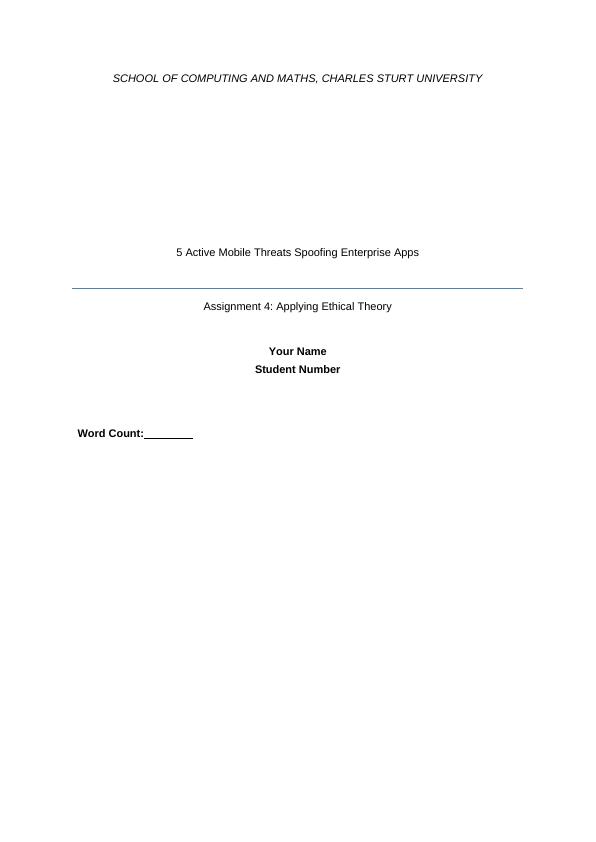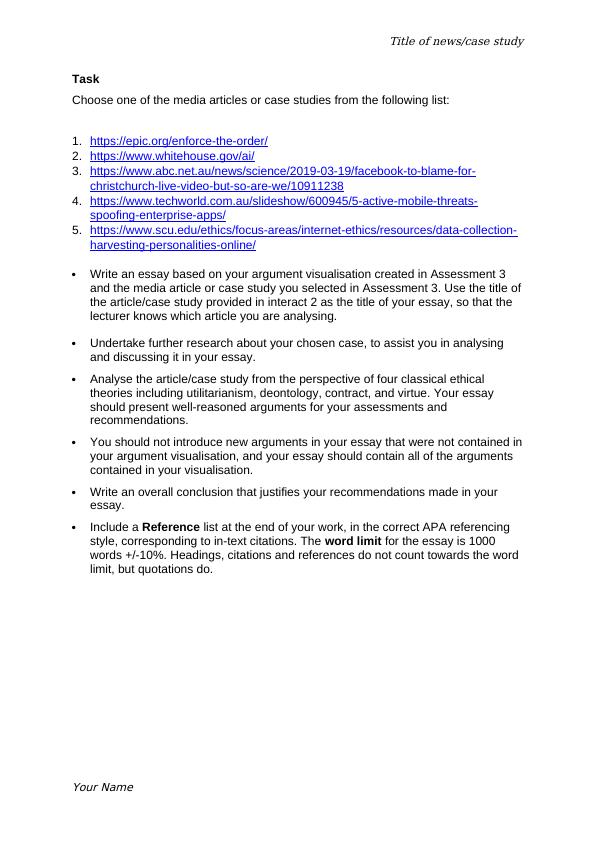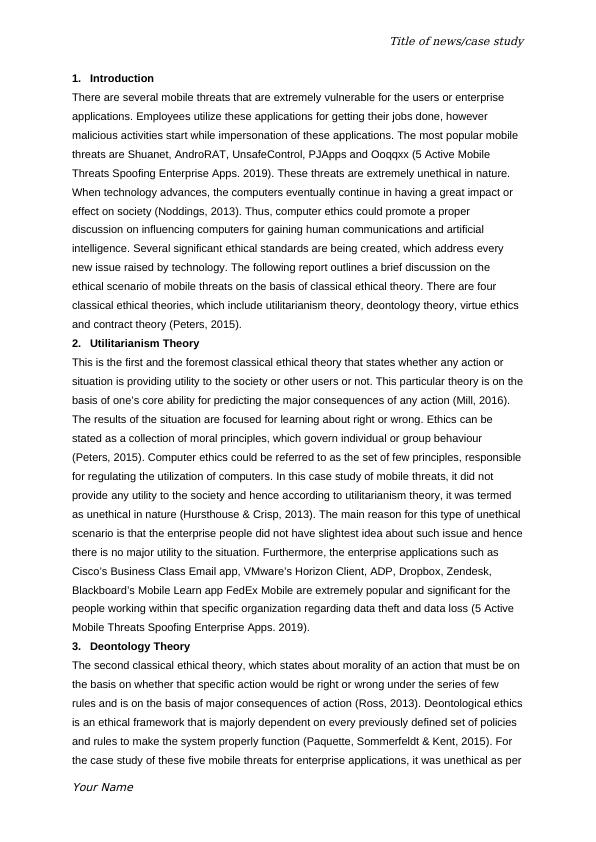5 Active Mobile Threats Spoofing Enterprise Apps
Added on 2022-11-18
6 Pages2194 Words130 Views
SCHOOL OF COMPUTING AND MATHS, CHARLES STURT UNIVERSITY
5 Active Mobile Threats Spoofing Enterprise Apps
Assignment 4: Applying Ethical Theory
Your Name
Student Number
Word Count:
5 Active Mobile Threats Spoofing Enterprise Apps
Assignment 4: Applying Ethical Theory
Your Name
Student Number
Word Count:

Title of news/case study
Task
Choose one of the media articles or case studies from the following list:
1. https://epic.org/enforce-the-order/
2. https://www.whitehouse.gov/ai/
3. https://www.abc.net.au/news/science/2019-03-19/facebook-to-blame-for-
christchurch-live-video-but-so-are-we/10911238
4. https://www.techworld.com.au/slideshow/600945/5-active-mobile-threats-
spoofing-enterprise-apps/
5. https://www.scu.edu/ethics/focus-areas/internet-ethics/resources/data-collection-
harvesting-personalities-online/
Write an essay based on your argument visualisation created in Assessment 3
and the media article or case study you selected in Assessment 3. Use the title of
the article/case study provided in interact 2 as the title of your essay, so that the
lecturer knows which article you are analysing.
Undertake further research about your chosen case, to assist you in analysing
and discussing it in your essay.
Analyse the article/case study from the perspective of four classical ethical
theories including utilitarianism, deontology, contract, and virtue. Your essay
should present well-reasoned arguments for your assessments and
recommendations.
You should not introduce new arguments in your essay that were not contained in
your argument visualisation, and your essay should contain all of the arguments
contained in your visualisation.
Write an overall conclusion that justifies your recommendations made in your
essay.
Include a Reference list at the end of your work, in the correct APA referencing
style, corresponding to in-text citations. The word limit for the essay is 1000
words +/-10%. Headings, citations and references do not count towards the word
limit, but quotations do.
Your Name
Task
Choose one of the media articles or case studies from the following list:
1. https://epic.org/enforce-the-order/
2. https://www.whitehouse.gov/ai/
3. https://www.abc.net.au/news/science/2019-03-19/facebook-to-blame-for-
christchurch-live-video-but-so-are-we/10911238
4. https://www.techworld.com.au/slideshow/600945/5-active-mobile-threats-
spoofing-enterprise-apps/
5. https://www.scu.edu/ethics/focus-areas/internet-ethics/resources/data-collection-
harvesting-personalities-online/
Write an essay based on your argument visualisation created in Assessment 3
and the media article or case study you selected in Assessment 3. Use the title of
the article/case study provided in interact 2 as the title of your essay, so that the
lecturer knows which article you are analysing.
Undertake further research about your chosen case, to assist you in analysing
and discussing it in your essay.
Analyse the article/case study from the perspective of four classical ethical
theories including utilitarianism, deontology, contract, and virtue. Your essay
should present well-reasoned arguments for your assessments and
recommendations.
You should not introduce new arguments in your essay that were not contained in
your argument visualisation, and your essay should contain all of the arguments
contained in your visualisation.
Write an overall conclusion that justifies your recommendations made in your
essay.
Include a Reference list at the end of your work, in the correct APA referencing
style, corresponding to in-text citations. The word limit for the essay is 1000
words +/-10%. Headings, citations and references do not count towards the word
limit, but quotations do.
Your Name

Title of news/case study
1. Introduction
There are several mobile threats that are extremely vulnerable for the users or enterprise
applications. Employees utilize these applications for getting their jobs done, however
malicious activities start while impersonation of these applications. The most popular mobile
threats are Shuanet, AndroRAT, UnsafeControl, PJApps and Ooqqxx (5 Active Mobile
Threats Spoofing Enterprise Apps. 2019). These threats are extremely unethical in nature.
When technology advances, the computers eventually continue in having a great impact or
effect on society (Noddings, 2013). Thus, computer ethics could promote a proper
discussion on influencing computers for gaining human communications and artificial
intelligence. Several significant ethical standards are being created, which address every
new issue raised by technology. The following report outlines a brief discussion on the
ethical scenario of mobile threats on the basis of classical ethical theory. There are four
classical ethical theories, which include utilitarianism theory, deontology theory, virtue ethics
and contract theory (Peters, 2015).
2. Utilitarianism Theory
This is the first and the foremost classical ethical theory that states whether any action or
situation is providing utility to the society or other users or not. This particular theory is on the
basis of one’s core ability for predicting the major consequences of any action (Mill, 2016).
The results of the situation are focused for learning about right or wrong. Ethics can be
stated as a collection of moral principles, which govern individual or group behaviour
(Peters, 2015). Computer ethics could be referred to as the set of few principles, responsible
for regulating the utilization of computers. In this case study of mobile threats, it did not
provide any utility to the society and hence according to utilitarianism theory, it was termed
as unethical in nature (Hursthouse & Crisp, 2013). The main reason for this type of unethical
scenario is that the enterprise people did not have slightest idea about such issue and hence
there is no major utility to the situation. Furthermore, the enterprise applications such as
Cisco’s Business Class Email app, VMware’s Horizon Client, ADP, Dropbox, Zendesk,
Blackboard’s Mobile Learn app FedEx Mobile are extremely popular and significant for the
people working within that specific organization regarding data theft and data loss (5 Active
Mobile Threats Spoofing Enterprise Apps. 2019).
3. Deontology Theory
The second classical ethical theory, which states about morality of an action that must be on
the basis on whether that specific action would be right or wrong under the series of few
rules and is on the basis of major consequences of action (Ross, 2013). Deontological ethics
is an ethical framework that is majorly dependent on every previously defined set of policies
and rules to make the system properly function (Paquette, Sommerfeldt & Kent, 2015). For
the case study of these five mobile threats for enterprise applications, it was unethical as per
Your Name
1. Introduction
There are several mobile threats that are extremely vulnerable for the users or enterprise
applications. Employees utilize these applications for getting their jobs done, however
malicious activities start while impersonation of these applications. The most popular mobile
threats are Shuanet, AndroRAT, UnsafeControl, PJApps and Ooqqxx (5 Active Mobile
Threats Spoofing Enterprise Apps. 2019). These threats are extremely unethical in nature.
When technology advances, the computers eventually continue in having a great impact or
effect on society (Noddings, 2013). Thus, computer ethics could promote a proper
discussion on influencing computers for gaining human communications and artificial
intelligence. Several significant ethical standards are being created, which address every
new issue raised by technology. The following report outlines a brief discussion on the
ethical scenario of mobile threats on the basis of classical ethical theory. There are four
classical ethical theories, which include utilitarianism theory, deontology theory, virtue ethics
and contract theory (Peters, 2015).
2. Utilitarianism Theory
This is the first and the foremost classical ethical theory that states whether any action or
situation is providing utility to the society or other users or not. This particular theory is on the
basis of one’s core ability for predicting the major consequences of any action (Mill, 2016).
The results of the situation are focused for learning about right or wrong. Ethics can be
stated as a collection of moral principles, which govern individual or group behaviour
(Peters, 2015). Computer ethics could be referred to as the set of few principles, responsible
for regulating the utilization of computers. In this case study of mobile threats, it did not
provide any utility to the society and hence according to utilitarianism theory, it was termed
as unethical in nature (Hursthouse & Crisp, 2013). The main reason for this type of unethical
scenario is that the enterprise people did not have slightest idea about such issue and hence
there is no major utility to the situation. Furthermore, the enterprise applications such as
Cisco’s Business Class Email app, VMware’s Horizon Client, ADP, Dropbox, Zendesk,
Blackboard’s Mobile Learn app FedEx Mobile are extremely popular and significant for the
people working within that specific organization regarding data theft and data loss (5 Active
Mobile Threats Spoofing Enterprise Apps. 2019).
3. Deontology Theory
The second classical ethical theory, which states about morality of an action that must be on
the basis on whether that specific action would be right or wrong under the series of few
rules and is on the basis of major consequences of action (Ross, 2013). Deontological ethics
is an ethical framework that is majorly dependent on every previously defined set of policies
and rules to make the system properly function (Paquette, Sommerfeldt & Kent, 2015). For
the case study of these five mobile threats for enterprise applications, it was unethical as per
Your Name

End of preview
Want to access all the pages? Upload your documents or become a member.
Related Documents
Information Technology Ethics: Blame on Social Media for Christchurch Videolg...
|7
|2280
|38
Applying Ethical Theory in Cybercrimelg...
|7
|2167
|228
Applying Ethical Theory - PDFlg...
|7
|2438
|92
(Doc) Ethical Theories Essaylg...
|7
|2455
|192
5 Active Mobile Threats Spoofing Enterprise Apps: Applying Ethical Theorylg...
|7
|1311
|91
AI, Death, and Mourning: Applying Ethical Theorylg...
|6
|2166
|133
